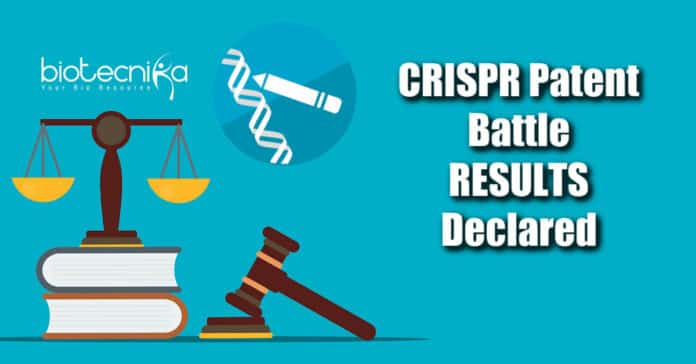CRISPR Patent Case: Broad Institute Wins The Battle
CRISPR-Cas9 is a novel technology that allows scientists to edit regions of the genome by removing, adding, or modifying DNA segments using biological “scissors.” Emmanuelle Charpentier and Jennifer Doudna discovered the sequence in 2012. However, patent battles have engulfed the technology ever since.
On 28 February, a U.S. judiciary handling patent disputes ruled that MIT and Harvard University’s Broad Institute own patents on the groundbreaking CRISPR technology.
The decision of the United States Patent and Trademark Office is a setback for the University of California, Berkeley, the University of Vienna, and Nobel Prize-winning researcher Emmanuelle Charpentier (CVC group).
The Broad Institute of MIT and Harvard, which obtained the first CRISPR patent in 2014 and subsequent related patents, said that the judgment proved that their patents were correctly granted.
Clinical trials are underway to see if CRISPR can treat genetic diseases and abnormalities.
In 2012, Doudna from UC Berkeley and Charpentier from the University of Vienna applied for a CRISPR patent. After 8 years, they were awarded the Nobel Prize in Chemistry for their CRISPR research.
On the other hand, Broad claimed that its 2014 patent was different from the earlier invention as it is involved with the usage of CRISPR in eukaryotic cells, such as those used for genome editing.
The court stated that there was “no doubt” that the California and Vienna schools developed a CRISPR system foremost, but they didn’t exhibit that they created a system that works with eukaryotic cells prior to Broad’s patented invention.
The judgment can be petitioned to the Federal Circuit Court of Appeals, which hears patent cases. In 2018, that court passed a judgment in favor of Broad in an associated case.
The UC stated in a statement that it was considering “different alternatives” to challenge the judgment and that it and its partners held more than 40 other CRISPR patents.
Editas Medicine Inc, which licenses CRISPR technology from the Broad Institute, stated that the judgment solidifies the power of the patents, which it uses to develop medications against severe illnesses.
Various academic institutions and biotech companies hold many incremental and related patents in their efforts to make it a medical reality. These biotech firms have obtained licenses from Broad or CVC group. However, as a result of this judgment, CVC licensees will be forced to renegotiate with Broad, which will cost CVC huge amounts of money in licensing fees. It is always costly to renegotiate such licenses.
Jacob Sherkow, professor of law at New York Law School’s Innovation Center for Law and Technology, said that this could result in a loss of $100 million to $10 billion in licensing revenues for UC-Berkeley.
Some industry experts have called for creating a patent pool to solve the licensing puzzle of the entire CRISPR-Cas9 complex patent and licensing. A patent pool eliminates the need to negotiate multiple licenses from different patent holders, resulting in a user-friendly global market while commercializing the technology for its owners – a win scenario for both groups.
Check out Biotecnika App for more recent Updates, News, and Job vacancies.






























